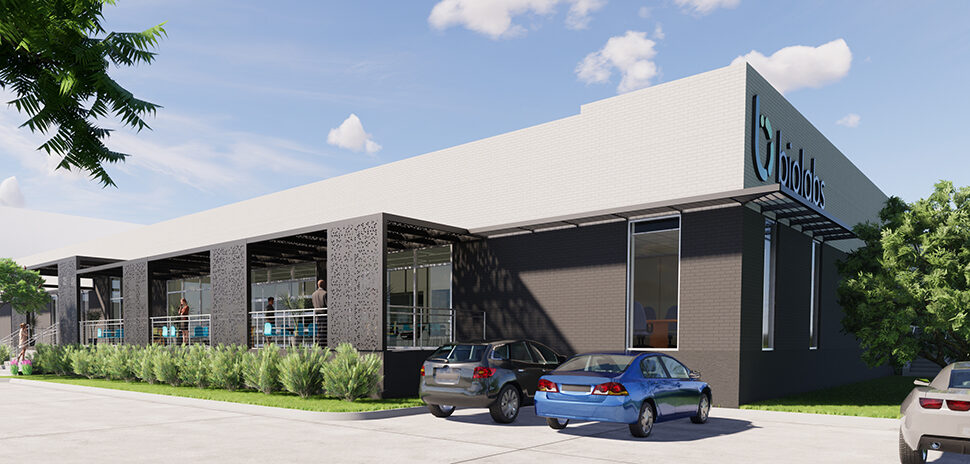Dallas College—in partnership with several other North Texas higher ed institutions and biomedical businesses—just received an $8.8 million grant from the U.S. Economic Development Administration (EDA) that could keep the region’s biotech boom growing for years to come.
The college and officials call the award “groundbreaking” in its power to help train much-needed workers for scores of local biotech businesses. Moreover, the program will create opportunities by training underserved community members for living-wage jobs in one of the region’s hottest, most fast-growing sectors.

Ben Magill, associate vice chancellor of economic opportunity at Dallas College
Dallas-Fort Worth is projected to add more than 200,000 jobs over the next three years, according to Ben Magill, associate vice chancellor of economic opportunity, workforce, and advancement at Dallas College.
The award will help the college “establish the critical economic and workforce development infrastructure needed to fill those jobs, increase economic mobility for underserved communities, and create additional jobs,” Magill said in today’s announcement.
‘This grant is a game changer’
Tom Luce calls the grant “a game changer” for the region’s bio and life sciences workforce—and for the students “who will soon have stronger and more direct pathways into high-paying jobs with career growth opportunities.
“Of all jobs in Dallas, only 40% are currently considered ‘good jobs.’ Thanks to this grant, that share will increase and thereby help to strengthen our healthcare institutions and our region’s economic vitality, said Luce, who is CEO of Biotech Initiatives at Lyda Hill Philanthropies, in a statement.
DFW’S life science ecosystem ranks No. 16 in the U.S.
Just last month, Dallas-Fort Worth was ranked No. 16 among U.S. metros for having “the most favorable combination of factors for a successful life sciences ecosystem,” according to a study by CommercialCafe.
And that momentum is poised to continue. Healthcare and healthcare support occupations are expected to be the fastest growing industry sector in North Texas, expanding by about 8% or more in the next few years, Dallas College’s Magill says.
To take advantage of that growth, the region needs more biotech workers—so the $8.8 million grant has arrived at an ideal time.

Dr. Justin Lonon, Dallas College Chancellor. [Photo: Dallas College]
Dallas College Chancellor Justin Lonon said the grant was the result of “years of behind-the-scenes work” with many partners in industry and higher ed, all with the goal of benefitting “the surrounding diverse communities we serve.”
Training the biotech workforce of the future
With the EDA grant, Dallas College, Tarrant County College, Collin College, and the University of Texas at Arlington will create a career pathway model in three areas: biotechnology, biomanufacturing, and bioinformatics. At the same time, an employer-led biotechnology advisory council will help make the most of new employment and educational opportunities.
In the grant’s first year, Dallas College educators will analyze existing educational gaps in the region, identify future opportunities for curriculum and programs, and recruit underserved populations to participate in biotech workforce training while providing wraparound services to help participants succeed.
Introductory ‘boot camp’ will train 800 participants
While Dallas College takes the lead role in the program, partners Collin College, Tarrant County College, and UT Arlington will offer an introductory “boot camp” to train 800 participants for entry-level biotech jobs. The schools will join forces to build a biotech career pathway model across all levels of education, identifying future career opportunities.
‘Good jobs’ guaranteed by top North Texas employers
The college wants employer input and participation from inception, Magill told Dallas Innovates.

[Image: istockphoto]
Some of the region’s biggest healthcare/life science employers—Children’s Health Medical Center, McKesson, Medical City-HCA Healthcare, Tenet Health, Texas Health Resources, Evolve Biologics, and UT Southwestern Medical Center—have already committed to hiring a combined 1,100 entry-level biotech workers, providing above-living wages plus healthcare, retirement, and other benefits.
With the help of the DFW Hospital Council, Bio North Texas (BioNTX), and the Dallas Regional Chamber, leaders of the initiative plan to continue to add employer partners in healthcare and IT. At the same time, they’ll network through Dallas College’s nonprofit employer outreach programs and partner with economic development corporations across North Texas.
Pegasus Park, Lyda Hill Philanthropies, and others are boosting biotech innovation
Together, the partnerships and grant will help advance the region’s flourishing life science ecosystem that includes the development of Pegasus Park, which partners with Lyda Hill Philanthropies and area businesses and higher ed institutions, to boost local biotech innovation, officials said.
Pegasus Park’s BioLabs at Pegasus Park, a 37,000-square-foot incubator offering shared wet labs and office spaces, has become a magnet for biotech and healthcare startups. As those startups move on to find success in new digs—as Aakha Biologics did last month—they’ll keep the biotech momentum growing.
And they’ll need new workers to do that. According to a Pegasus Park spokesperson, the funding helps put North Texas in the company of other major biotech hubs.
“To continue to make advancements in science, the biotech industry requires a variety of skilled employees. I am thrilled to see North Texas receive this national support for its burgeoning biotech ecosystem through this significant grant to grow its biotech workforce and provide the support employees need to be successful,” said Lyda Hill, founder of Lyda Hill Philanthropies.
Quincy Preston contributed to this report.
![]()
Get on the list.
Dallas Innovates, every day.
Sign up to keep your eye on what’s new and next in Dallas-Fort Worth, every day.














![At the Fourth Annual iC3 Life Science Summit at UT Arlington on Oct. 10, 2017 recipient Lyda Hill will present the award. To register for the summit, visit www.bionorthtx.org. [Illustration: bestbrk/istockphoto]](https://s24806.pcdn.co/wp-content/uploads/2018/09/Bionorthconcept_970_bestbrk_istockphotovector-molecule-background-genetic-and-chemical-compounds-abstract-vector-id908258902-264x350.jpg)



















































